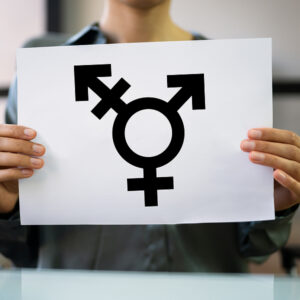For an alternate viewpoint, see “Point: Schools Are for Learning, Not Therapy.”
The first question asked when a baby is born is their gender. That question is always binary — a boy or a girl.
Sex identification is essential, and to parents, it’s monumentally important. No one asks whether the baby is lesbian, queer, bisexual, transexual or any other variation Americans have become aware of in the past half-century.
However, sexual identity is now front and center on our political stage, joining the controversy about sex education. Education about “how babies are made” has long been debated — who should answer this question, and at what age? The issue broadens today with our new awareness that sexual identity is not binary. Should we deny it? Share it? Teach about it in school? In books? At what age?
The existence of people who are L.G.B.T.Q. is not a new phenomenon. The reality is that there have always been variations on the gender continuum. Societal stigma and controversy have kept this currently uncomfortable information out of the mainstream and out of the potential angst of parents. When, how and by whom this information should be shared with our children is now a hot political topic.
It’s worth considering what an uneducated child might make of the social media, TV, or movies around them that contain explicit sexual behavior and gender diversity. It’s naïve to think they won’t come to conclusions. Should they be guided by scientific facts about biology or left to the schoolyard prejudices and jokes of our parents’ generation?
Most experts and educators agree that waiting until children have acquired information mainly from their peers is too late. That information is the most likely to be distorted and thus harmful to our children. Education near the end of elementary school may be controversial, but children will be most susceptible to misinformation soon after that if they are not already. Remember that our youth are going through puberty far earlier than in the past.
Sex education and questions of sexual identity have aroused fear among many parents, voiced primarily by those on the political right. Their understandable concern is that the political left and peer pressure will “corrupt” their children into becoming more sexually active and encourage them to move beyond traditional binary gender roles.
We need to understand and respect the genuine fears of many parents. Fear of change. Fear for their beloved and vulnerable children.
We must also be aware of the politicians who exploit fear and parental concerns. We’ve been here before. Politicians who said they would protect our children from sitting next to children of a different race, ethnicity, religion and culture. And now, protection from children who have a different gender orientation.
Parents may believe they are the most suited to teach sexual and gender-related matters. It may be true if they are deeply engaged and have a good relationship. When they take the time to discuss sexual and gender identity issues with their children, parents are most effective — especially when they are open and knowledgeable.
However, if the understanding of sex shared by our parents is any indication, most of us are ill-equipped for the task. Our generation has paid the price with too much ignorance concerning sex and gender-related topics. We should do better for the children we love.
Change is complex, and our best instincts are to protect our children. But our children often can teach us. Children in schools across the country fear far less than their parents unless the mom and dad have instilled their fear. A child sitting next to a child who is different is not damaged, harmed or corrupted. Often, they benefit, just as we had when our generation was exposed to differences in race and ethnicity.
We live in a fast-changing world. We can deny new information at our children’s peril or choose to adapt.

